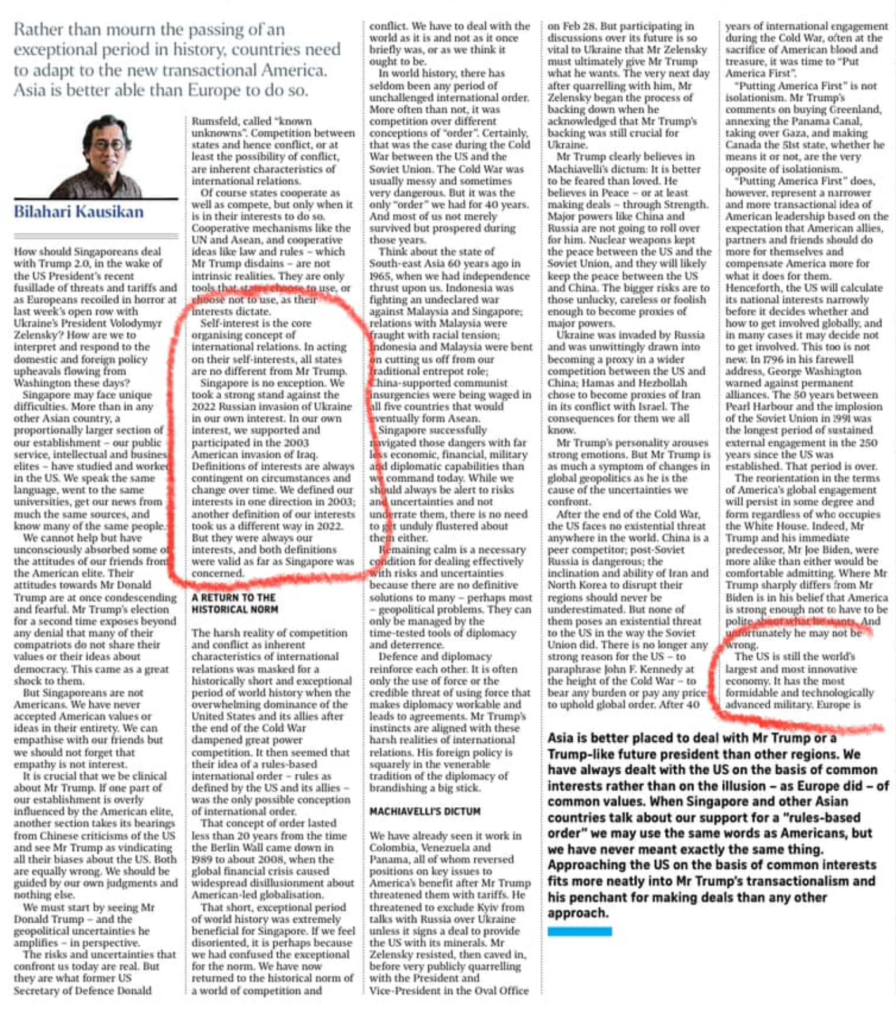Mr Bilahari Kausikan’s opinion piece on Monday, “Facing up to the realities of Trump 2.0”, is an admission of the state’s lack of sovereignty.
He says that “self-interest is the core organising concept of international relations”, and in that sense, Singapore is no different from the current US President Donald Trump.
He cites Singapore supporting and participating in the American invasion of Iraq in 2003 and the strong stand we took against the Russian invasion of Ukraine in 2022 as examples of us acting in our own interest.
The former Ambassador-at-Large in the Ministry of Foreign Affairs of Singapore adds that circumstances change, and we have to adjust our interests accordingly—“We defined our interests in one direction in 2003; another definition of our interests took us a different way in 2022,” but “both are valid, as far as Singapore is concerned, because they were in our interest.”
He does not say directly how they were in our interests but alludes to it when he says that America is still the “largest and most innovative economy …. has the most formidable and technologically advanced military”.
He goes on to say that “Europe is incapable of deterring Russia without US support” and that “Asian allies, partners and friends cannot balance China on their own …. Countries may grumble, squirm and hedge by diversifying relations in all directions, but ultimately, there is no alternative to the US.”
In short, he is saying that it is in our interest to “accommodate America’s demands”, as we have just done “by finally acting against smuggling of Nvidia chips to China”.
I can understand that such an approach will ensure our security and prosperity in the short term, akin to the small remora fish that attaches itself to the underbelly of a shark and eating the parasites on the latter’s skin and mouth that would otherwise irritate it.
The shark in return protects the remora and gives it safe and free transport across the ocean.
In the world of animals – whose interests rarely change, as they are based directly on the laws of nature – such symbiotic win-win relationships are viable survival strategies.
But in the world of humans, whose interest change frequently, depending on a powerful friend for our survival, is foolhardy, to say the least, as Henry Kissinger rightly said, “To be an enemy of the US is dangerous, but to be a friend is fatal.”
Saddam Hussein would have attested to that because, for the most of the 1980s, he was America’s stalking horse and best friend in the Middle East until things turned sour and they hunted him down like a dog and overran his country.
Nonetheless, Bilahari goes on to say that the trick is not to be sucked into being a proxy for major powers, citing proxies like Ukraine (he didn’t say of who, but clearly US/NATO), Hamas and Hezbollah (of Iran) – “the consequences for them we all know”.
But he did not mention, although he would certainly know, that it is a slippery slope between accommodating the demands of major powers and ending up being their proxy.
Accommodating the demands of the US may seem like a small price to pay for the elites, but its repercussions spread far and wide, making them difficult to foresee. Certainly, it does not come cost-free, and, oftentimes, ordinary people bear the burden.
For example, Singapore regularly purchases the latest fighter jets from the US using taxpayers’ money, while our neighboring countries make do with much older and less advanced jets.
We also signed a Free Trade Agreement (FTA) with the US—something no other ASEAN country has done—tying us to strict intellectual property rights that drive up the prices of medicines, software, and other intellectual property products.
The agreement also allows unlimited American professionals to work here, while Singaporeans face a quota when working in the US.
Additionally, Americans are exempt from paying Additional Buyer’s Stamp Duty (ABSD) when purchasing property here. During Covid, American vaccines were prioritized while Chinese vaccines were sidelined.
The list goes on.
Worse still, accommodating America’s demands makes us unprincipled and hypocritical.
We sanctioned Russia ostensibly to “stand up for international law, which is vital for the survival of small states”, but why aren’t we sanctioning Israel? The latter broke even more international laws in its genocide of the Palestinians.
The reason, as Bilahari alluded to, is because it is in our interest to “accommodate America’s demands” – America wants to weaken Russia, and therefore, we should sanction it, but America is joint at the hip with Israel, so we had better not only not sanction Israel, but should quietly abet it.
We are fortunate our Muslim neighbours, Indonesia and Malaysia, are tolerant of our double standards, but we should stop testing their people’s patience because our hypocrisy is clear for all to see, and our best bet for long-term survival lies in working closely with them and the other ASEAN members and not with America.
I would love to see all ASEAN countries conducting joint military exercises and co-ordinating their military hardware and software so that they are interoperable and can fight as one unit instead of wasting resources on military exercises with the US, UK, Australia and NZ.
Would they really defend us if we are attacked when we don’t even share the same land and fate, unlike ASEAN?
Finally, accommodating America’s demands often means that the government will have to make decisions that do not align with the wishes of the people, thereby oppressing them and eroding their sovereignty, and that of the State.
It’s been 60 years since Independence. It is high time we become truly independent.

The post Singapore’s Sovereignty: Reality or Illusion? appeared first on The Online Citizen.


